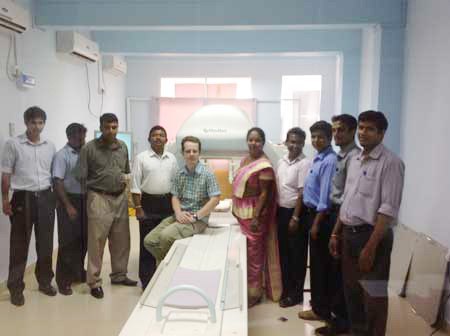HISTORY
The Nuclear Medicine Unit (NMU), Faculty of Medicine, University of Peradeniya was the first facility established in Sri Lanka to provide Nuclear Medicine service for early detection of cancer and therapeutic purposes. This unit was established in 1972 on the recommendation and support by the International Atomic Energy Agency (IAEA). Since its inception the NMU has provided a service function to the entire country. Over the years the scope of its’ patient care services has expanded from Radioimmuno assay (RIA) for thyroid functioning tests to radionucleic therapy.
During the last two decades IAEA has supported NMU by providing equipment and services and also aided in manpower development. In 2006, with the support of IAEA the NMU pioneered to establish a newborn clinic for congenital hypothyroidism. During the last decade, experts in different fields have helped to uplift the unit to current standards. NMU works closely with international community thus it has organized two international training programs in 2014 and 2015 carried out as regional workshops for Nuclear Medicine professionals. Also, NMU has successfully completed and qualified in the QUNAM audits carried out by the IAEA.

Between the periods of 2012 to 2016, the unit underwent a major infrastructure development together with an upgrading of services provided. The University of Peradeniya supported the infrastructure development while with the support of IAEA the unit was installed with a new Gamma camera, DEXA machine for bone densitometry and a Radioiodine therapy unit for the management and care of cancer and renal patients.
Today, this unit is capable of providing all major Nuclear Medicine applications under one roof; RIA for hormone assays, Technetium isotope based imaging for various disease diagnoses (e.g. bone, renal (DTPA/DMSA) and thyroid scans, red cell labeling, HIDA and lymphocintigraphy) and over 3000 such scans are being done per annum. Radioiodine therapy for both benign and malignant thyroid diseases is carried out in this unit. 100-150 thyroid cancer patients per year receive both diagnostic and therapeutic services. Furthermore, NMU has an exceptionally trained technical staff which has gained overseas training in different fields of Nuclear Medicine in several occasions.
The NMU has now widened its undergraduate training program by including students from Allied health sciences and Nuclear Science faculties. Also the postgraduate teaching and research contribution of NMU has made University of Peradeniya nationally and internationally renowned.